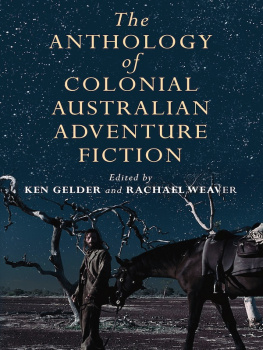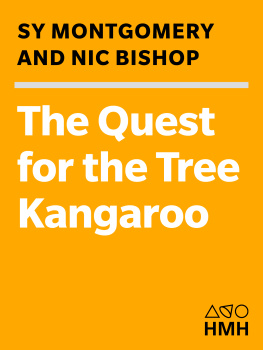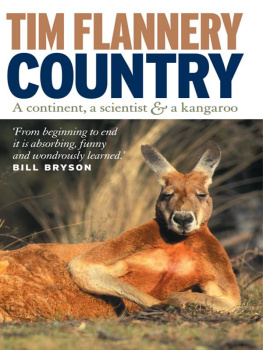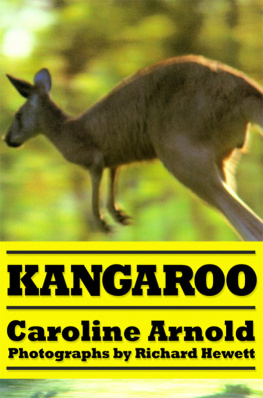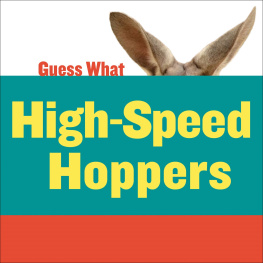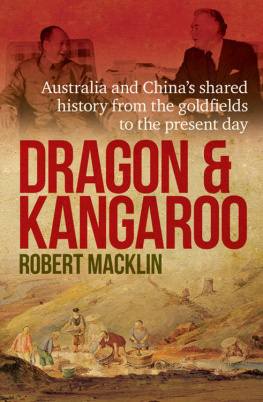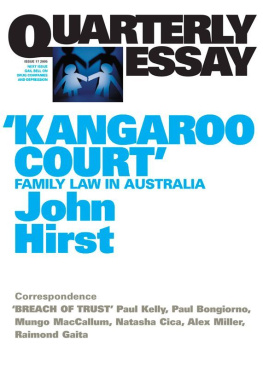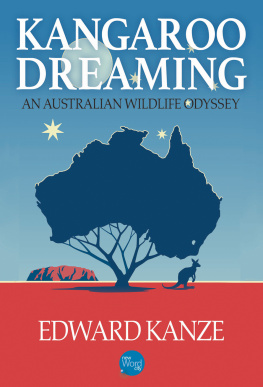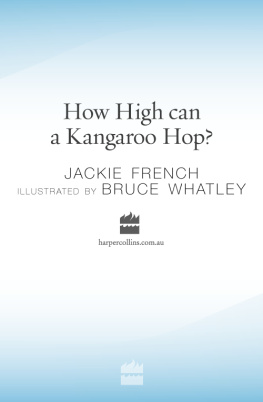This is number one hundred and ninety
in the second numbered series of the
Miegunyah Volumes
made possible by the
Miegunyah Fund
established by bequests
under the wills of
Sir Russell and Lady Grimwade.
Miegunyah was Russell Grimwades home
from 1911 to 1955
and Mab Grimwades home
from 1911 to 1973.
The Colonial Kangaroo Hunt
Ken Gelder & Rachael Weaver

THE MIEGUNYAH PRESS
An imprint of Melbourne University Publishing Limited
Level 1, 715 Swanston Street, Carlton, Victoria 3053, Australia
www.mup.com.au

First published 2020
Text Ken Gelder and Rachael Weaver, 2020
Design and typography Melbourne University Publishing Limited, 2020
This book is copyright. Apart from any use permitted under the Copyright Act 1968 and subsequent amendments, no part may be reproduced, stored in a retrieval system or transmitted by any means or process whatsoever without the prior written permission of the publisher.
Every attempt has been made to locate the copyright holders for material quoted in this book. Any person or organisation that may have been overlooked or misattributed may contact the publisher.
Text design and typesetting by Cannon Typesetting
Cover design by Pfisterer + Freeman
Printed in China by 1010 Printing International Ltd

ISBN 9780522875850 (paperback)
ISBN 9780522875867 (ebook)
Contents
Acknowledgements
Research for this book was made possible through the generous support of the Australian Research Council Discovery Grant Scheme. We also gratefully acknowledge the financial support we have received from the School of Culture and Communication and the Australian Centre at the University of Melbourne. We thank the librarians at the Mitchell Library, Sydney, and the University of Melbournes Baillieu Library, for their assistance with books and manuscripts; and we thank staff at the many galleries and museums who have helped us with image reproductions and permissions. Thanks go to colleagues in the School of Culture and Communication at the University of Melbourne for their encouragement and many useful suggestions along the way: in particular, Deirdre Coleman, Greg Lehman, Stephanie Trigg and Justin Clemens. Thanks to John Frow at the University of Sydney for encouraging us to think about the bildungsroman. Wed especially like to thank Tom Ford, from the Department of Creative Arts and English at La Trobe University, for drawing our attention to what is now this books epigraph. Thanks as well to Jane Brown from our schools Visual Culture Resource Centre for her careful preparation of many of the images reproduced in this book; and thanks also to Giles Fielke for assisting with the purchase of some of the images in this book. We are particularly grateful to Alisa Bunbury, the Grimwade Collection Curator at the Ian Potter Museum of Art, University of Melbourne, for so generously sharing with us her remarkable expertise in colonial visual culture. Finally, we thank Louise Stirling, Katie Purvis, Klarissa Pfisterer and Nathan Hollier at Melbourne University Publishing for their enthusiasm and support for this colonial project.
Note on Measurements
Measurements in this book are generally imperial rather than metric. One mile is approximately 1.6 kilometres; one acre is 0.4 hectares; one pound (lb) is 0.45 kilograms (450 grams).
And lo! a transport comes in view
I hear the merry motley crew,
Well skilled in pocket to make entry,
Of Diemans Land the elected Gentry,
And founders of Australian Races.
The Rogues! I see it in their faces!
Receive me, Lads! Ill go with you,
Hunt the black swan and kangaroo,
And that New Holland well presume
Old England with some elbow-room.
Across the mountains we will roam,
And each man make himself a home
Samuel Taylor Coleridge, The Delinquent Travellers, 1824
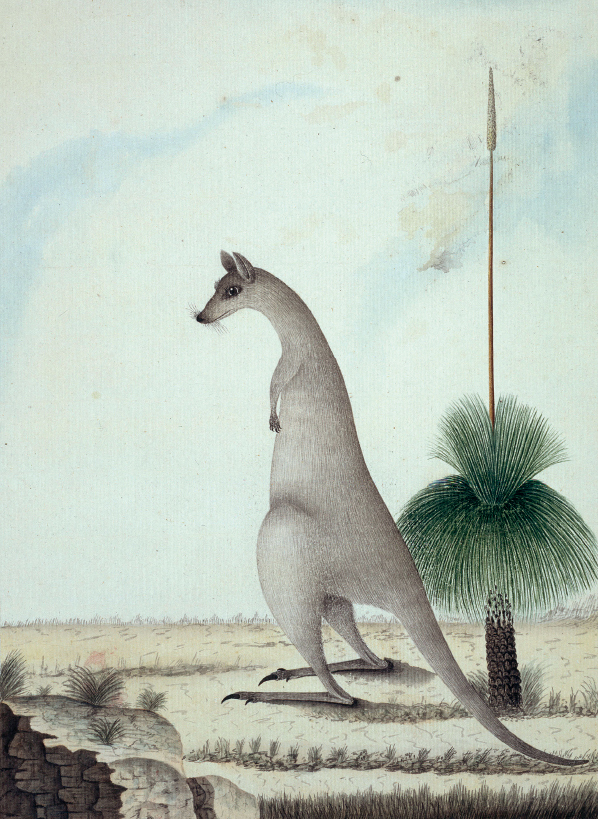
George Raper, Gum-Plant and Kangooroo of New-Holland, 1789
Shooting the First Kangaroos
Who shot the first kangaroo? Aboriginal people hunted kangaroos with spears and clubs for thousands of years, of course, either alone or in groups. Penny Olsen and Lynette Russell note the wide variety of Aboriginal hunting methods, including pursuit with dingoes, spearing, ambush, encirclement, stockades, pitfall traps and battues, where beaters drive game towards the hunters. The battue (from the French battre: to beat or hit) became important to white pastoralists after settlement too, and we shall see some examples of the large-scale extermination of kangaroos in colonial Australia later in this book. But the first shooting of a kangarooor rather, the first documented shootinghappened a few years before white settlement officially began.
James Cooks first HMS Endeavour voyage around the world saw the ship grounded on a reef off the coast of far north Queensland in June and July 1770. The botanist Joseph Banks was on board, along with Daniel Solander, who had studied under the famous Swedish naturalist Carl Linnaeus; Linnaeuss taxonomies for species
For John Simons, the first documented shooting of a kangaroo on 14 July 1770 contains in itself the microcosm of the settlement of Australia.Endeavours crew. It is certainly a foundational moment in the violent European settlement of Australia.
The first shooting of a kangaroo happens simultaneously with the naming of the species, as if the two things are inevitably tied together. Markham Ellis has noted that the Endeavours naturalists were also interested in collecting vocabulary and drew on local Aboriginal names for the kangaroo: for example, the Guugu Yimidhirr word ganguru, which signified one of the five kangaroo and wallaby species indigenous to Endeavour River.
To shoot a native species and to name that species are both colonising acts. Soon afterwards, naturalists would compete with each other to give the kangaroo its scientific name. It was the English zoologist George Shaw who eventually succeeded and, as Danielle Clode notes, the full taxonomic designation of the species is now in fact Macropus giganteus Shaw 1790. But something interesting happened with Cooks earlier Aboriginal-derived naming of the kangaroo that, for a moment at least, placed this creature outside the developing taxonomic framework of Western scientific classifications of species.
In Cooks descriptions above, the kangaroo is perhaps surprisingly compared to a greyhound. Banks kept a greyhound on the Endeavour that soon afterwards joined in the hunt for kangaroos. In his journal of the expedition, the botanist has a running title for this earliest of encountersKill Kanguruthat both names the new species and immediately sentences it to death.
Cooks journal entry for 27 July goes on to provide a sense of just how quickly the body of the kangaroo was dismantled into its component partsfor scientific analysis, but also to provide meat for an expedition low on provisions. His blunt account of the stripping-down of the animal contrasts with Bankss comments on the treatment of the one Gore had shot two weeks earlier, which was much smaller, at 28 pounds. The Beast which was killd yesterday, Banks writes, was today Dressd for our dinner and provd excellent meat.

Next page

